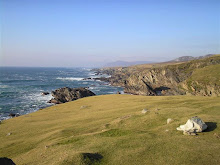 Former Governor Walter J. Hickel penned an OpEd piece which appears in today's Anchorage Daily News, entitled "Alaskans can rise above petty politics, hateful acts."
Former Governor Walter J. Hickel penned an OpEd piece which appears in today's Anchorage Daily News, entitled "Alaskans can rise above petty politics, hateful acts."Bravo, Mr. Hickel.
During his long career, no matter what his stance on issues, and no matter what less-than-complimentary things one might say about him, even his detractors (and as a life-long Democrat, I fall into that category) have to grudgingly agree on this point:
Walter Hickel has always followed his conscience.
Just as Pinocchio had his Jiminy Cricket, Walter Hickel has always had his "Little Man."
When appointed in 1968 by President Richard Nixon to serve as Secretary of Interior (an appointment Mr. Hickel agonized about accepting, for it required him to step down as Alaska Governor), Wally didn't turn out to be quite the "plunder and pillage" pro-development voice many environmentalists expected him to be.
Listening to his "little man," Hickel supported strong liability laws concerning oil companies drilling offshore, and supported environmental standards on Alaska's rapidly developing oil industry.
As a populist (and perhaps because he was a populist with a conscience), Mr. Hickel confused and confounded the people in the White House at the time.
He saw his role as Secretary of the Interior as doing the best job he could do for the American people. By doing his best, Hickel surmised, he would help the Republican Party as well.
When that style conflicted with the political agenda of Richard Nixon, Spiro Agnew or the cadre of Republican henchman in the White House, they saw his actions as "disloyal."
It didn't take long. More and more, Wally Hickel was being frozen out of the Nixon White House, his access to the president that hired him cut off. The president was isolating himself more and more from those who might disagree with him, because any thing viewed as internal dissent would not be accepted, nevermind encouraged.
After the shooting death of four student demonstrators by the Ohio National Guard at Kent State University in 1970, Mr. Hickel's "little man" took charge again.
Hickel wrote a letter critical of Nixon's Vietnam war policy, urging the president to listen to the voices of young people opposing the war. The contents of letter was leaked before the president saw it, and it didn't sit well with the White House.
The president subsequently created the National Oceanographic and Atmospheric Administration within the Commerce Department, and created an independent Environmental Protection Administration. The creation of these agencies intentionally removed their mission from the purview of the Interior Secretary. The handwriting was on the wall.
Eventually, Hickel was called to the White House. After a half-hour or so conversation between Wally and the president, Mr. Hickel was shown the door.
True to what he told 60 Minutes: "If I go away, I'm going away with an arrow in my heart and not a bullet in my back," Mr. Hickel returned to Alaska, and eventually (like it or not) served a second term as governor.
(Side note to ex-governor Sarah Palin: Wally Hickel was a "maverick" when you were barely out of diapers. His willingness to take responsibility for his actions is a concept that's alien to you, I'm sure.)
Some of my liberal friends will criticize me for lauding Mr. Hickel.
Too bad.
In retrospect, Walter Hickel emerges as a progressive. Hell, compared to today's current crop of Republicans, he sounds like a "liberal."
Besides, when you're right, you're right.
In a time when the GOP is controlled by the right-wing fringe, hate speech is running rampant, and crazy people like Sarah Palin claim to speak for Alaskans (and the "real" America), 90-year old Governor Walter Hickel's is a voice that should be heeded.
By all of us.
h/t to Progressive Alaska for the photo.

2 comments:
My favorite Hickel story was after he appointed a very well qualified Larry Card to the Superior Court, Hickel was asked by the media how he felt about appointing the first black person to the bench. Hickel responded "I did what?". He saw no color, he reviewed all the applicants and chose the best one. Judge Card was one of the very finest of Hickel's picks. The other members of Hickel's picks were a little long in the tooth. The joke that was floating around back then.... how do you know that a Hickel appointee was using the computer? The whiteout on the computer screen.
When conservative means "character" and "conservation."
Post a Comment